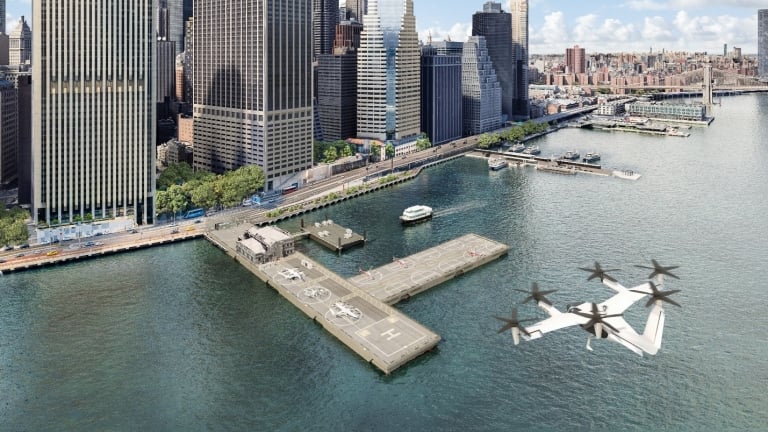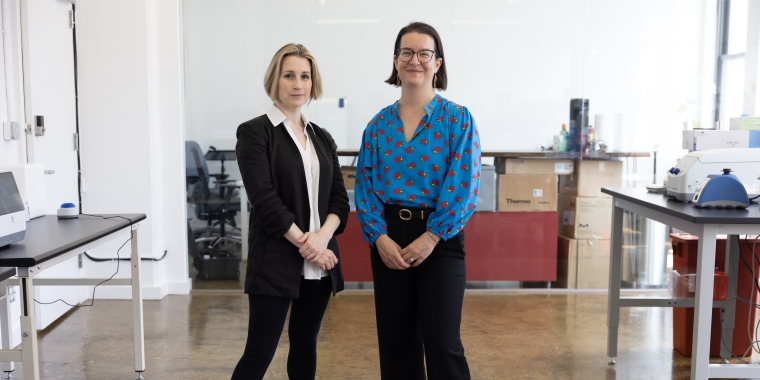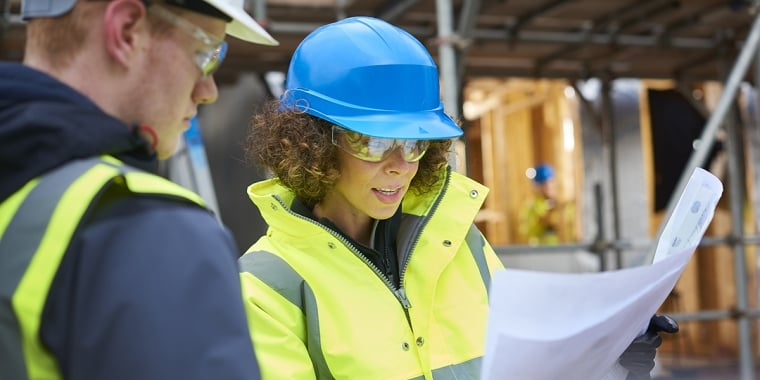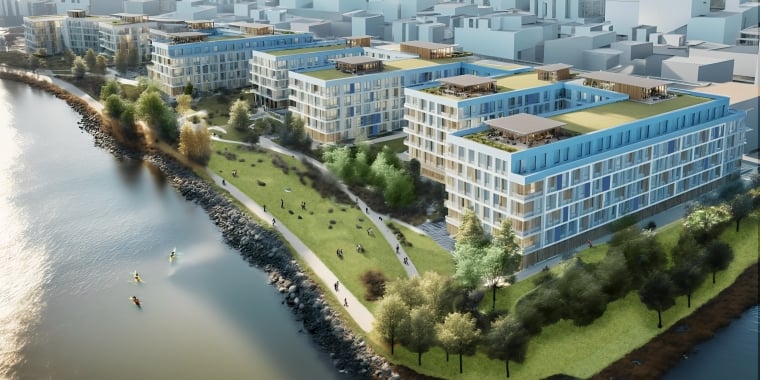
‘Downtown Skyport’ will Establish New York City as the First City in the World to Adapt its Heliport Infrastructure to Support Sustainable Air Mobility Technologies and Bolster Last-Mile and Maritime Freight Distribution
New York City Furthers its Commitment for Quieter and More Sustainable Helicopter and Freight Alternatives to Improve Quality of Life for New Yorkers
NEW YORK, NY—Today, New York City Economic Development Corporation (NYCEDC) announced Downtown Skyport as the new operator of the Downtown Manhattan Heliport (DMH) following a Franchise and Concession Review Committee (FCRC) public hearing. Following a competitive Request for Proposal (RFP) process, Downtown Skyport will take over management of DMH to continue existing operations and upgrade the City-owned heliport to provide the supporting infrastructure for electric vertical take-off and landing (eVTOL) aircraft, as well as last-mile maritime freight delivery. In November 2023, Mayor Adams and NYCEDC announced a new vision of transforming the heliport into a sustainable, multi-modal transportation and logistics hub.
Downtown Skyport is a joint venture between Skyports Infrastructure (Skyports), a leading provider of ground infrastructure for the advanced air mobility industry, and Groupe ADP, a world leader in airport design, construction, financing, and operation. Skyports and Groupe ADP have extensive experience in heliport/airport operations. Skyports owns and operates one of two public heliports in London and is developing eVTOL infrastructure across multiple continents. Groupe ADP owns and operates 26 airports worldwide, including Issy-les-Moulineaux Heliport and Charles de Gaulle Airport in Paris, France and is part of a joint venture operating New York Stewart International Airport.
Following a transition period with the heliport’s current operator, Downtown Skyport will assume control of operations at DMH in early 2025. The targeted completion of the design and permitting process for the new charging infrastructure for eVTOL aircraft and last-mile maritime infrastructure is 2026.
“Today New York City's Harbor of the Future takes a huge step forward, advancing the city's vision for an inter-modal, electrified transportation network that sets a global example for electrified, quiet flight in urban environments and a Blue Highway network for improved last-mile movement of freight,” said First Deputy Mayor Maria Torres-Springer. “I look forward to the execution of this plan and the improvements in quality of life and economic impacts that come with it.”
“NYCEDC is proud to welcome Downtown Skyport as the new operator of the Downtown Manhattan Heliport,” said New York City Economic Development Corporation (NYCEDC) President & CEO Andrew Kimball. “With their expertise in global transportation, Downtown Skyport is perfectly positioned to advance the Adams Administration’s vision of transforming DMH into a hub for cutting-edge mobility. By integrating eVTOL technology—a quieter, greener alternative to traditional helicopters—and facilitating maritime freight and last-mile deliveries, this initiative will not only reduce truck traffic but bring huge quality of life improvements for all New Yorkers.”
“Skyports and Group ADP are proud to be selected by NYCEDC to transform the Downtown Manhattan Heliport (DMH) into a future-ready, multi-modal hub,” said Duncan Walker, CEO of Skyports. “By integrating eVTOL infrastructure and maritime freight capabilities at DMH, the facility will serve as a lynchpin to advance the City's goals of creating a comprehensive micro distribution network along the ‘Blue Highway’ and improve quality of life for New Yorkers. This milestone positions New York City as a leader in quiet, electric mobility solutions and sets a benchmark for cities across the U.S. and globally.”
Downtown Skyport has committed to making DMH and the New York City skies quieter and more sustainable by:
- Investing in the supporting infrastructure (e.g., chargers) and any necessary utility upgrades within the initial five-year term in anticipation of eVTOL certification and commercial viability;
- Incentivizing the adoption of quiet eVTOL technology to address community quality of life concerns;
- Diversifying DMH activities and mitigating the challenges of traffic congestion in the City by developing and operating a maritime facility for last-mile micro-distribution funded in part by nearly $1 million of a $5 million grant from the U.S. Department of Transportation Maritime Administration (MARAD) grant awarded to NYCEDC to create and support a “Marine Highway” network;
- Expanding minority and women owned business enterprises (M/WBE) outreach required for all work including 30 percent utilization goals for site development and construction activities;
- Introducing workforce development training programs that improve access to career pathways in aviation, maritime, transportation, logistics, and other relevant sectors;
- And improvements to the main passenger terminal to enhance the overall customer experience.
“We are leading the charge to electrify our City’s fleet operations with the largest on-road electric fleet and charging networks in New York State, and we are excited to support EDC in these latest efforts to electrify helicopter transportation,” said DCAS Commissioner Louis A. Molina. “Together, we will make all forms of transportation—on the road, in the water, and in the air—cleaner and more sustainable.”
“Transforming the Downtown Manhattan Heliport into a sustainable, multi-modal, transportation and logistics hub will help re-shape the way our city handles last-mile deliveries for years to come. NYC DOT looks forward to continuing our support of this effort with world-class greenway and safe street connections for the heliport,” said NYC DOT Commissioner Ydanis Rodriguez. “We congratulate Downtown Skyport and welcome our new partner in delivering revolutionary transportation and freight options for New Yorkers.”
“The noise and environmental impact of the heliport have been long-standing concerns for our residents, and I’m proud to see NYCEDC take these steps toward a quieter, greener, and more innovative future. I’m glad to have worked with them on this, and I’m excited to see how this transformation improves the quality of life for our neighbors while setting a new standard for sustainable transportation,” said Assemblyman Charles D. Fall.
“As Chair of the Economic Development Committee, I’ve fought for decarbonization and sustainable solutions across sectors, particularly in the aviation industry,” said Councilmember Amanda Farias. “The selection of ‘Downtown Skyport’ as the new operator for the Downtown Manhattan Heliport is a pivotal step toward addressing noise and environmental concerns by advancing electric vertical take-off and landing (eVTOL) technology. Retrofitting the heliport for quieter and greener alternatives establishes New York City as a global leader in sustainable air mobility, and I’m committed to continuing this work with the EDC to ensure we remain at the forefront of innovation and environmental responsibility. I look forward in continuing my partnership with NYC EDC and our heliport industry partners to continue fighting to address the needs of New Yorkers.”
“Investing in sustainable helicopter infrastructure at the Downtown Heliport to reduce noise and air pollution is a big step in the right direction,” said New York City Councilmember Gale A. Brewer. “I appreciate the city’s efforts to address the quality of life and public health issues caused by helicopters and look forward to partnering with the City and the operator on further minimizing the impact on our communities.”
“By embracing cutting-edge eVTOL technology and expanding the Blue Highways initiative, we are making significant strides in reducing sound pollution and environmental impact in Lower Manhattan,” said Tammy Meltzer, Chair of Manhattan Community Board 1. “These advancements will bring meaningful quality-of-life improvements through quieter, cleaner alternatives for air travel and commercial goods transportation, all while propelling us toward a more sustainable and efficient future.”
“The New York City blue economy plays a vital role in reducing carbon emissions and addressing supply chain challenges. The selection of Downtown Skyport to lead the next phase of operations at the Downtown Manhattan Heliport marks a significant step forward in the City's commitment to blue economy innovation. By transitioning to cleaner helicopter alternatives and expanding the Blue Highway, we can reduce truck traffic, decarbonize transportation, and strengthen water-based solutions that support a more sustainable and resilient future for New York City,” said Cortney Koenig Worrall, president and CEO, Waterfront Alliance.
“Vertical Aviation International (VAI) supports an environment where Advanced Air Mobility (AAM) accessibility creates competitive but inclusive conditions for this new vertical aviation aircraft and the exciting possibilities that come with it. Our over 16,000 members are passionate in their belief that we should be investing in our vertical aviation infrastructure, not diminish it,” said Josh Rousseau, VAI Northeast US Regional Representative. “We commend NYCEDC for their continued commitment to investing in both current and future vertical aviation needs and services.”
“Stop the Chop NY/NJ congratulates the new operators of the Downtown Manhattan Heliport (DMH) for being chosen by the NYCEDC after a long and competitive RFP process,” said Melissa Elstein, Board Chair & Secretary, Coalition Organizer, Stop The Chop NY/NJ. “In prioritizing environmental and quality of life concerns in this decision, NYCEDC is taking an important first step towards eliminating nonessential fossil fuel-run helicopters from its heliports—a move that Stop the Chop NY/NJ has long advocated for. Although we still seek a full and immediate ban of the 30,000 annual sightseeing helicopter flights, we applaud the reduced helicopter hours and better tracking of DMH-vicinity air quality, noise complaints, helicopter flights, and greenhouse gas emissions—data we believe should be made publicly available. We remain optimistic about eVTOLs' replacement of traditional fossil-fuel helicopters, a transition that we urge be fast-tracked (along with flight caps) to account for local community concerns, such as quality of life issues, noise and air pollution. Finally, we support the ‘over water only’ dispersal routes for the commuter helicopter traffic that currently disrupts all too many New Yorkers who reside or work under their loud, low-flying paths. As a key stakeholder, Stop the Chop NY/NJ represents the tens of thousands of New Yorkers harmed by helicopter traffic. NYC’s commitment to quieter and more sustainable helicopter alternatives to improve the quality of life for New Yorkers is a vital step in reducing those harms.”
“New York City continues to make progress in the burgeoning high-tech air taxi industry which will offer outstanding employment opportunities for the next generation of students who aspire to be pilots, engineers, maintenance technicians, ‘vertiport’ managers and more,” said President Dr Sharon B. DeVivo, president and chief executive officer. “Vaughn College is pleased to partner with Skyports and Groupe ADP to create the jobs of the future.”
“Aviation High School is excited to see the next phase of the future of flight become a reality in New York City at the Downtown Manhattan Heliport,” said Steven R. Jackson, Principal, Aviation High School. “New opportunities, with the future use of Advanced Air Mobility eVTOL aircraft, will mean green, quiet, and affordable local travel for the residents of New York City and new career opportunities for our students!”
Last fall, two leading eVTOL companies, Joby and Volocopter, conducted back-to-back piloted demonstration flights from an urban heliport. The flights took off from DMH, conducted overwater maneuvers against the backdrop of Lower Manhattan, the Brooklyn Bridge, Governors Island, and the Statue of Liberty, before touching back down at the heliport. In October, Joby hosted a public electric air taxi display at Vanderbilt Hall in Grand Central Terminal. Even with piloted flight test campaigns underway by multiple eVTOL companies, Federal Aviation Administration (FAA) certification is expected by 2026.
In May 2015, the United States Maritime Administration designated the Brooklyn Waterfront as a component of America’s Marine Highway (AMH). Building on this designation, in 2022 NYCEDC received a $5.16 million U.S. Department of Transportation (USDOT) and Maritime Administration (MARAD) grant to strengthen critical freight movement on waterways by enabling additional landings to dock watercraft and prepare cargo for local delivery.
The utilization of marine highway services to transport and deliver cargo helps to reduce emissions, decrease wear and tear on roadways, alleviate supply chain bottlenecks, and move goods more quickly from ships to shelves. Further, the competition of each of these sites increases transportation resiliency and redundancy, making New York City better equipped to receive goods during times of emergency or disaster.
Last year, the New York City Department of Transportation and NYCEDC released a Request for Expressions of Interest (RFEI) for the Blue Highways Program in NYC. The goal of the program is to activate the marine highway to move goods into and throughout NYC. It will not only help reduce emissions but also reduce traffic congestion and improve road safety by removing some of the truck traffic from the City’s roadways and spark new opportunities for economic growth.
Downtown Skyport’s concession agreement at DMH will be for five years with a five-year renewal conditioned upon the timely build-out of the eVTOL charging and maritime freight berthing infrastructure. Two additional five-year renewal options are available at the City’s discretion.
About NYCEDC
New York City Economic Development Corporation is a mission-driven, nonprofit organization that works for a vibrant, inclusive, and globally competitive economy for all New Yorkers. We take a comprehensive approach, through four main strategies: strengthen confidence in NYC as a great place to do business; grow innovative sectors with a focus on equity; build neighborhoods as places to live, learn, work, and play; and deliver sustainable infrastructure for communities and the city's future economy. To learn more about what we do, visit us on Facebook, Twitter, LinkedIn, and Instagram.


